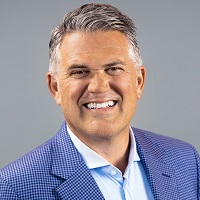How to Find Room for Philanthropy Despite Challenging Times
The 'philanthropic squeeze' hits when consumers face higher costs and lower investment returns. Consider these three ways to maintain charitable giving.


Profit and prosper with the best of Kiplinger's advice on investing, taxes, retirement, personal finance and much more. Delivered daily. Enter your email in the box and click Sign Me Up.
You are now subscribed
Your newsletter sign-up was successful
Want to add more newsletters?

Delivered daily
Kiplinger Today
Profit and prosper with the best of Kiplinger's advice on investing, taxes, retirement, personal finance and much more delivered daily. Smart money moves start here.

Sent five days a week
Kiplinger A Step Ahead
Get practical help to make better financial decisions in your everyday life, from spending to savings on top deals.

Delivered daily
Kiplinger Closing Bell
Get today's biggest financial and investing headlines delivered to your inbox every day the U.S. stock market is open.

Sent twice a week
Kiplinger Adviser Intel
Financial pros across the country share best practices and fresh tactics to preserve and grow your wealth.

Delivered weekly
Kiplinger Tax Tips
Trim your federal and state tax bills with practical tax-planning and tax-cutting strategies.

Sent twice a week
Kiplinger Retirement Tips
Your twice-a-week guide to planning and enjoying a financially secure and richly rewarding retirement

Sent bimonthly.
Kiplinger Adviser Angle
Insights for advisers, wealth managers and other financial professionals.

Sent twice a week
Kiplinger Investing Weekly
Your twice-a-week roundup of promising stocks, funds, companies and industries you should consider, ones you should avoid, and why.

Sent weekly for six weeks
Kiplinger Invest for Retirement
Your step-by-step six-part series on how to invest for retirement, from devising a successful strategy to exactly which investments to choose.
We have all been feeling the squeeze as of late, and philanthropy is feeling it, too. The costs of things we buy, be it food or clothing or even entertainment (have you seen the price of a baseball game recently?), seem only to go one way — higher.
According to the consumer price index, eggs increased in cost by 60% at the end of 2022, compared to how much they cost in 2021. Other kitchen staples, including butter, margarine and flour, increased in cost by 23% to 44%.
That's the first part of the "squeeze" — the other being that stocks, bonds and other assets have fallen. Economists blame inflation, pandemic remnants and supply-chain challenges.
From just $107.88 $24.99 for Kiplinger Personal Finance
Become a smarter, better informed investor. Subscribe from just $107.88 $24.99, plus get up to 4 Special Issues

Sign up for Kiplinger’s Free Newsletters
Profit and prosper with the best of expert advice on investing, taxes, retirement, personal finance and more - straight to your e-mail.
Profit and prosper with the best of expert advice - straight to your e-mail.
We're left with two issues: The things we use the money for are increasing in cost, and the sources of money's growth (stocks, bonds, etc.) are declining — hence, the squeeze. The financial squeeze may make us reconsider donating to the causes we care about, but now's the time to keep giving. Giving back is not only the right thing to do, but it also feels good to know you are making a positive impact in the world.
Here are a few ways to find room for philanthropy, even in challenging economic times.
1. Take a closer look at your finances.
If you still need to, now's the time to evaluate your finances and see if there's anything excessive to cut. Donate funds to a charity of choice by creating (and sticking to) a reasonable budget.
Once you can set aside money to donate, consider automating a monthly contribution so you won't be tempted to spend the money elsewhere.
Depending on your economic situation, you may also consider contributing to a donor-advised fund (DAF). A donor-advised fund allows investors to contribute to a charitable fund while still keeping control over the assets.
With these funds, donors get an immediate tax deduction while controlling how to invest the assets (including stocks, bonds, mutual funds, Bitcoin and crypto, among others) and for which charities over time.
Contributing to a DAF during a high-income year is a great opportunity to both maximize your philanthropic efforts and charitable tax benefits. A DAF allows you to start small and encounter far less of the red tape that comes with private foundations. A DAF also does not mandate a certain cadence with respect to grants. In fact, the capital continues to grow tax-free (though it is no longer yours) until you and your family decide which nonprofits you would like to support.
2. Make donating a family effort.
In September 2022, Patagonia's founder, Yvon Chouinard, transferred the company's ownership to two nonprofits fighting climate change. Patagonia estimates that $100 million annually will go toward environmental efforts.
To plan and implement his legacy gift, Chouinard established a board of trustees and included his family in the planning process. When a donor's family understands the big-picture goal, they'll likely want to support and contribute.
Donors who include their families in ongoing discussions about their intentions and details of the plan will find it easier to get them on board. Building fond memories of bonding over helping others will likely ensure a generational legacy and a smooth transition.
Not only can contributing to a nonprofit as a family create memories and a bond, but it also puts more resources in the same place. Instead of each family member donating to a different cause, multiple people support the same cause and create a more significant impact.
3. Support nonprofits in other ways.
There are several ways to support nonprofits that don't cost money but still make a big difference.
Start by volunteering your time. Nonprofits need helping hands to get things done. With volunteers, they can carry out their mission. Look for volunteer opportunities in your area related to causes you care about.
Donate your unused miles or points to a specific charity or a cause. If you're not using them, consider donating your credit card points or rewards cash to nonprofits. Donating points means no tax deduction, but you don't have to open your wallet to support your favorite nonprofit.
If you're ready to spring clean or declutter your home, there are so many helpful ways you can donate items to organizations in need. From books and cell phones to computers and eyeglasses, there's someone who can benefit from it. Just make sure to get a receipt for tax deductions!
Contractors and business owners may also consider donating their services to help a nonprofit. Teaching a class, providing consulting or working on a project pro bono is a way to support a cause.
Finally, spread the word about your favorite nonprofits. If you're active online, share social media posts from the organization to boost awareness or drop a donation link into your next email newsletter. Sharing, talking about and engaging with charitable organizations does make a difference.
Donations to charities have been on a roller coaster these last few years due to the pandemic and the financial market, and these organizations are feeling the squeeze on both ends. As donors, it is up to us to help charities continue to fight for important causes as much as possible.
ALINE Wealth is a group of investment professionals registered with Hightower Securities, LLC, member FINRA and SIPC, and with Hightower Advisors, LLC, a registered investment advisor with the SEC. Securities are offered through Hightower Securities, LLC; advisory services are offered through Hightower Advisors, LLC.
Profit and prosper with the best of Kiplinger's advice on investing, taxes, retirement, personal finance and much more. Delivered daily. Enter your email in the box and click Sign Me Up.

Peter J. Klein, CFA®, CAP®, CSRIC®, CRPS®, is the Chief Investment Officer and Founder of ALINE Wealth, a wealth management firm that specializes in providing clients with financial planning advice for every stage of their lives. Along with Peter’s deep financial wisdom, he adds considerable acumen in philanthropy, helping clients navigate family trusts, institutions, and nonprofits.
-
 Dow Adds 1,206 Points to Top 50,000: Stock Market Today
Dow Adds 1,206 Points to Top 50,000: Stock Market TodayThe S&P 500 and Nasdaq also had strong finishes to a volatile week, with beaten-down tech stocks outperforming.
-
 Ask the Tax Editor: Federal Income Tax Deductions
Ask the Tax Editor: Federal Income Tax DeductionsAsk the Editor In this week's Ask the Editor Q&A, Joy Taylor answers questions on federal income tax deductions
-
 States With No-Fault Car Insurance Laws (and How No-Fault Car Insurance Works)
States With No-Fault Car Insurance Laws (and How No-Fault Car Insurance Works)A breakdown of the confusing rules around no-fault car insurance in every state where it exists.
-
 For the 2% Club, the Guardrails Approach and the 4% Rule Do Not Work: Here's What Works Instead
For the 2% Club, the Guardrails Approach and the 4% Rule Do Not Work: Here's What Works InsteadFor retirees with a pension, traditional withdrawal rules could be too restrictive. You need a tailored income plan that is much more flexible and realistic.
-
 Retiring Next Year? Now Is the Time to Start Designing What Your Retirement Will Look Like
Retiring Next Year? Now Is the Time to Start Designing What Your Retirement Will Look LikeThis is when you should be shifting your focus from growing your portfolio to designing an income and tax strategy that aligns your resources with your purpose.
-
 I'm a Financial Planner: This Layered Approach for Your Retirement Money Can Help Lower Your Stress
I'm a Financial Planner: This Layered Approach for Your Retirement Money Can Help Lower Your StressTo be confident about retirement, consider building a safety net by dividing assets into distinct layers and establishing a regular review process. Here's how.
-
 The 4 Estate Planning Documents Every High-Net-Worth Family Needs (Not Just a Will)
The 4 Estate Planning Documents Every High-Net-Worth Family Needs (Not Just a Will)The key to successful estate planning for HNW families isn't just drafting these four documents, but ensuring they're current and immediately accessible.
-
 Love and Legacy: What Couples Rarely Talk About (But Should)
Love and Legacy: What Couples Rarely Talk About (But Should)Couples who talk openly about finances, including estate planning, are more likely to head into retirement joyfully. How can you get the conversation going?
-
 How to Get the Fair Value for Your Shares When You Are in the Minority Vote on a Sale of Substantially All Corporate Assets
How to Get the Fair Value for Your Shares When You Are in the Minority Vote on a Sale of Substantially All Corporate AssetsWhen a sale of substantially all corporate assets is approved by majority vote, shareholders on the losing side of the vote should understand their rights.
-
 How to Add a Pet Trust to Your Estate Plan: Don't Leave Your Best Friend to Chance
How to Add a Pet Trust to Your Estate Plan: Don't Leave Your Best Friend to ChanceAdding a pet trust to your estate plan can ensure your pets are properly looked after when you're no longer able to care for them. This is how to go about it.
-
 Want to Avoid Leaving Chaos in Your Wake? Don't Leave Behind an Outdated Estate Plan
Want to Avoid Leaving Chaos in Your Wake? Don't Leave Behind an Outdated Estate PlanAn outdated or incomplete estate plan could cause confusion for those handling your affairs at a difficult time. This guide highlights what to update and when.